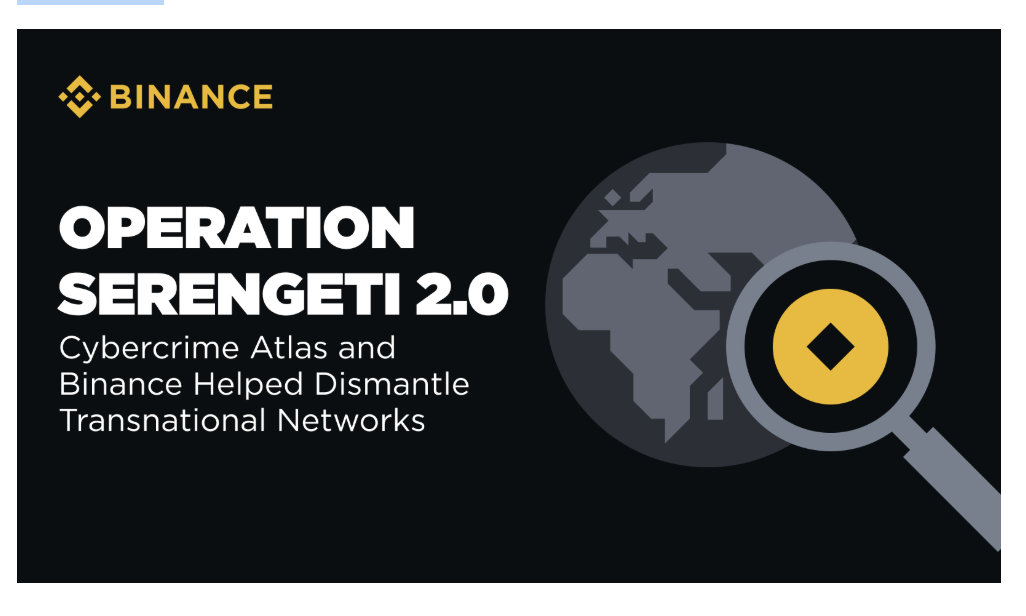Cybercrime knows no borders. As criminals exploit digital globalization, the need for coordinated, cross-sector action has never been greater. At Binance, we believe that safeguarding the digital ecosystem requires unity between private enterprises, law enforcement, and global organizations.
As a member of the Cybercrime Atlas, Binance is proud to have contributed to its cooperation on Operation Serengeti 2.0. This INTERPOL-coordinated operation with authorities across Africa disrupting cybercrime which led to a major takedown.
A Cross-Border Triumph
From June to August 2025, authorities across Africa, supported by INTERPOL and AFRIPOL, executed one of the largest cybercrime crackdowns to date. The operation targeted high-impact crimes such as ransomware, business email compromise (BEC), and cryptocurrency scams. They were flagged as critical threats in INTERPOL’s Africa Cyberthreat Assessment Report.
As a result, authorities arrested 1,209 cybercriminals linked to attacks on 88,000 victims, recovered $97.4 million, and dismantled 11,432 malicious infrastructures. Among the most notable achievements was the takedown of 25 illegal cryptocurrency mining centers in Angola. These centers siphoned energy resources to validate blockchain transactions. This operation also disrupted a $300 million crypto investment scam in Zambia that defrauded 65,000 victims.
Additionally, Angolan authorities seized 45 illicit power stations valued at over $37 million, redirecting their energy output to support vulnerable communities. These results show how global public-private cooperation can dismantle cybercriminals that leverage transnational networks.
The Cybercrime Atlas Initiative as a Blueprint for Collaboration
Hosted by the World Economic Forum, the Cybercrime Atlas unites over 30 private-sector leaders, including Binance, Microsoft, and Fortinet, with law enforcement to map and disrupt cybercriminal ecosystems. By pooling OSINT tools, expertise, and threat intelligence, this initiative creates a unified front against cyber threats.
Binance’s role in the initiative has been multifaceted. We have continuously been participating in weekly threat-hunting sessions with investigators to analyze emerging threats – contributing actionable intelligence and solutions to INTERPOL to hold cybercriminals accountable. In INTERPOL’s release, Valdecy Urquiza, INTERPOL’s Secretary General, said: “With more contributions and shared expertise, the results keep growing in scale and impact. This global network is stronger than ever, delivering real outcomes and safeguarding victims.”
OSINT – The Backbone of Modern Cybercrime Disruption
The Cybercrime Atlas relies on Open Source Intelligence (OSINT) to bypass jurisdictional barriers and privacy concerns. Publicly available data enables participants to map criminal infrastructures, such as illicit mining operations and phishing networks. It also helps to identify cross-border connections, like cyberattacks originating in Germany but executed in Côte d’Ivoire. Sharing these insights with global law enforcement enhances operational precision.
This approach allowed Angolan authorities to trace illegal crypto mining activities. Additionally it empowered Zambian officials to dismantle a sprawling investment scam. OSINT’s role in modern investigations is pivotal, bridging gaps between jurisdictions and enabling coordinated action.
The Power of Public-Private Partnerships
Operation Serengeti 2.0 is a perfect example of how effective the merging of public-sector authority with private-sector innovation is. Key mechanisms driving this collaboration include INTERPOL’s role as a trusted hub for sharing expertise between law enforcement and companies. The effort is transitioning from ad hoc support to long-term partnerships for sustained impact, and aligning efforts with frameworks like the WEF’s Cybercrime Atlas to target systemic vulnerabilities.
Final thoughts
For Binance, participation in initiatives like the Cybercrime Atlas reflects our commitment to fostering a safer digital future. As global economies digitize, we will continue to champion collaboration, innovation, education, and accountability to protect users worldwide.


